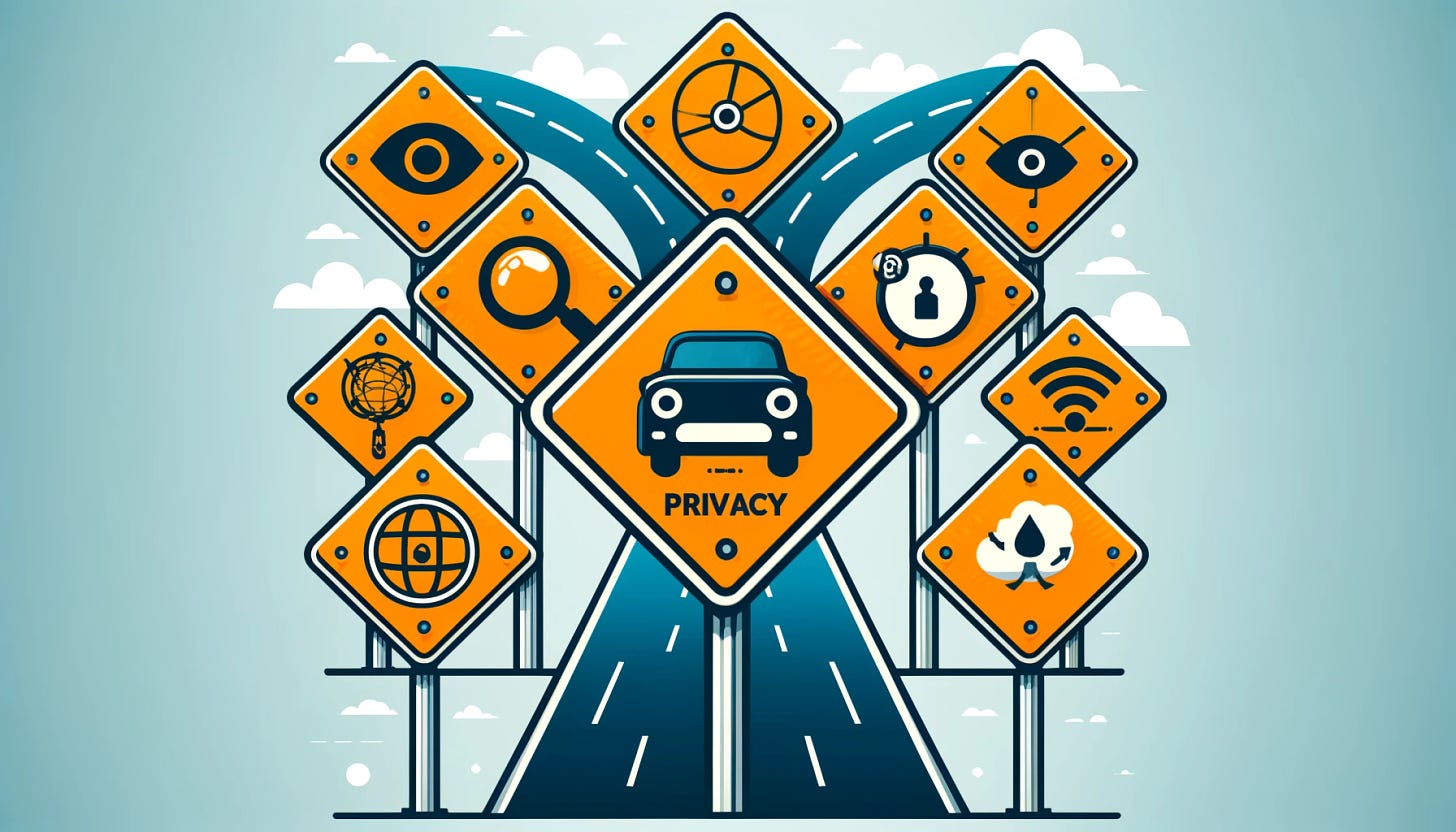How Your Car Spies On You - Spotlight #499
Straight Talk in a Tech World: Always Free, Always Private
Good Monday Morning!
It’s June 3rd. President and Dr. Biden will be traveling to France this week to commemorate the 80th anniversary of D-Day. Also traveling there: 101-year-old “Papa Jake” Larson, one of the few remaining veterans who witnessed the event, as more than 99% of all World War II veterans have passed away.
Today’s Spotlight is 914 words, about 3 1/2 minutes to read.
3 Headlines to Know
Internal Google Docs Reveal Search Priorities
Internal documents, spanning over 2,500 pages, reveal Google's increased reliance on manual site approvals for sensitive topics. As we've advised for years, the documents also reveal that user duration tied to search queries, alongside content quality and user behavior, remains crucial for ranking well in search. Read more at Content Marketing Institute
FBI: Man Used AI to Create 13,000 Child Abuse Images
The FBI charged a man with using AI to generate 13,000 child abuse images, showing that even AI-generated explicit content is a serious crime. Read more at The Guardian
TikTok's Offer to US: Control and Emergency Shutdown Rejected
TikTok proposed giving the US government control over its US operations and the ability to shut down the app if needed. The Biden administration declined, opting instead for a forced-sale law, leading to a major legal battle over national security concerns. Read more at The Washington Post
Focus on Privacy
Privacy Month: Celebrating 500 issues of Spotlight this month, we’re focused on privacy issues—a constant tech struggle.
Last issue: Bossware & Work Privacy.
Next: Facial Recognition, Location Brokers, and Retail Shopping
The Privacy Trade-Offs of Modern Car Technology
Modern cars are technological marvels, offering features like detecting approaching emergency vehicles, autonomous driving, and advanced navigation. These innovations enhance safety and convenience, transforming our driving experience. However, these benefits come at a significant cost to our privacy.
Extensive Data Collection and Sharing
Cars manufactured in recent years collect vast amounts of data, including location, driving habits, personal information, and even conversations. Sensors, cameras, and microphones, designed to improve safety and usability, also enable car manufacturers and third parties to gather and share extensive data about you.
For instance, General Motors shares detailed driving data with LexisNexis, a data broker working with insurers. This data, including reports of speeding, hard braking, and rapid acceleration, has been used to change insurance premiums, often without the driver's knowledge.
Consumer Unawareness Creates Regulatory Concerns
Many consumers are unaware of the extent of data collection and its privacy implications. Privacy policies are often lengthy and complex, making it hard for consumers to understand their consent. As a result, many drivers unknowingly agree to data collection when purchasing or leasing a vehicle, using its app, or registering for connected services.
Regulatory bodies and lawmakers are increasingly concerned about these practices. The U.S. Commerce Department is investigating data and cybersecurity risks posed by connected cars, including those manufactured by Chinese companies. Policymakers are also calling for stronger privacy laws to protect consumers.
Steps to Protect Your Privacy
You can protect your privacy with some effort. Review and adjust the privacy settings in your vehicle’s interface and related apps on your phone or computer, request data reports from brokers like LexisNexis and Verisk, and contact the manufacturer to opt out of unnecessary data collection. While these steps can help, the lack of transparency and control highlights the need for stronger regulatory oversight and consumer protection.
Modern car technology offers many benefits but also significant privacy risks. Greater transparency from car manufacturers and stronger consumer protection laws are essential to safeguard our privacy in this new era of connected vehicles.
Practical AI: Tribeca to Debut AI-Made Short Films
Tribeca Film Festival, known for showcasing innovative cinema, will feature five short films made using OpenAI's Sora model, which converts text to video. Read details at The Hollywood Reporter
Debunking Junk: Ex-Florida Deputy Spreads Russian Disinformation
John Mark Dougan, who fled to Russia in 2016, uses AI to create fake news sites, spreading disinformation for Russian intelligence. Read details at the New York Times
Protip: Remove AI From Google Search
Google’s new “Web” filter lets you switch off AI features in search results, showing only traditional text links for a simpler, old-school search experience. Learn more at Lifehacker
You are our best referral. Please forward this to a friend, colleague, or family member and suggest they subscribe. By now, you know that we always guard your privacy and our relationship with you each Monday morning.
Screening Room: McConaughey & Salesforce’s Great Data Heist
Science Fiction World: Rookies Staff Starbucks
South Korean robotics firm Naver had deployed 100 service robots named Rookie to the Starbucks in its HQ building, including a robot-only elevator and cloud-based “collective brain” similar to delivery services like Starship Enterprises at George Mason University and other U.S. colleges.
Tech For Good: AI Headphones Isolate One Voice in a Crowd
University of Washington researchers developed AI-powered headphones that allow users to focus on a single speaker's voice in noisy environments by simply looking at them for a few seconds. Read the university’s announcement and see their video
Coffee Break: Biff Celebrating MJF
In honor of Michael J. Fox’s 63rd (!) birthday on Sunday, enjoy this clip of former costar Thomas F. Wilson (Biff from the Back to the Future series) singing “The Question Song”.



